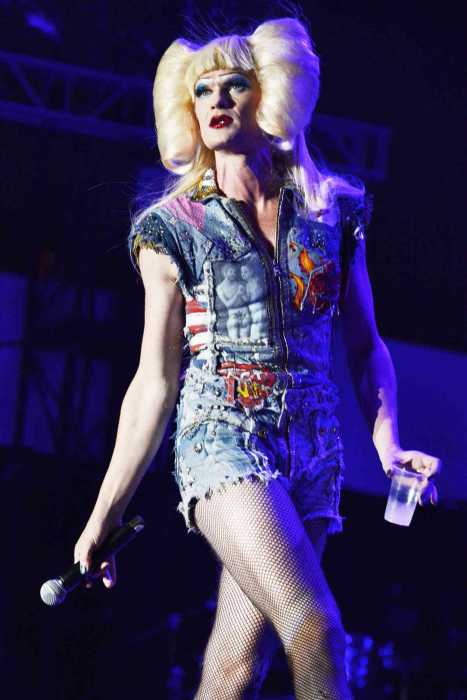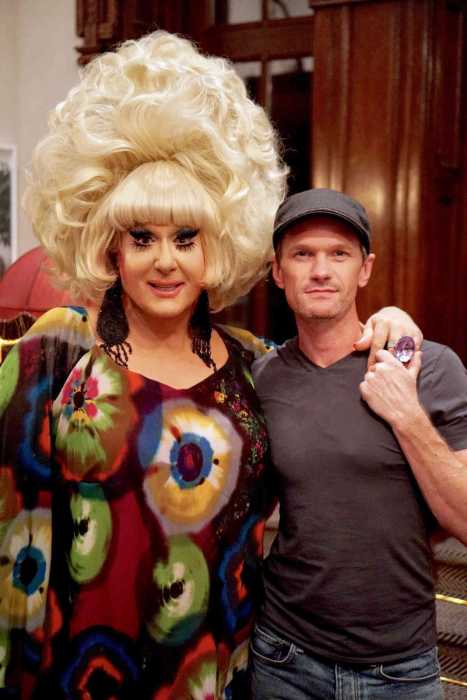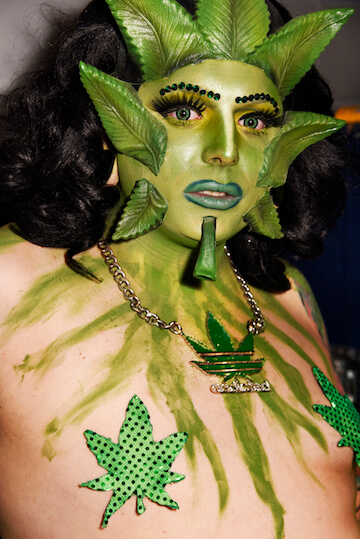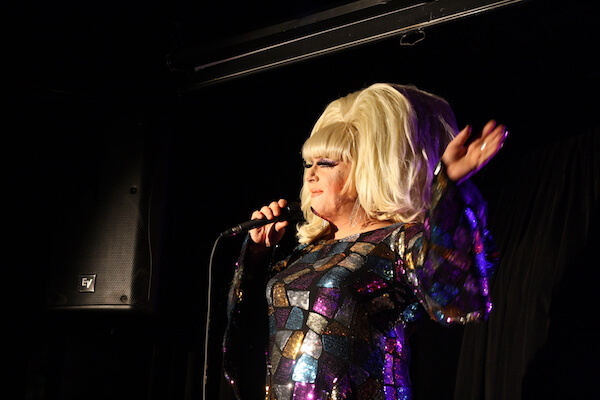Jonny Donahoe in “Every Brilliant Thing.” | WORLDOFWONDER.NET
It’s a new year, we have a new (shudder) president, and people are more depressed than ever, some even feeling suicidal. What was once literally regarded as the lunatic fringe of society has become the new normal, with everyone from six-year-olds to seniors feeling confused, or blue and dosing themselves away on meds.
There is someone who is taking the issue of deep depression on directly –– British performer Jonny Donahoe, who came to New York recently with his one man show “Every Brilliant Thing.” In it, he deals with mental and psychological challenges, especially as they related to his mother, who committed suicide. Far from being a dramatic downer, however, the show was frequently hilarious while trenchant as well as amazingly gentle and humane. The use of direct audience participation, with Donahoe skillfully maneuvering New Yorkers into playing various characters in his life, including himself, cleverly fueled the production, which happily turned out to actually be that most dreaded of words –– healing.
Handling the very skillful film translation of the play was a duo, whose work, particularly in the documentary field and on TV, will be familiar to many of you, Fenton Bailey and Randy Barbato, the gay founders of their estimable production company, World of Wonder.
IN THE NOH: Doc kings Bailey and Barbato are back, with surprisingly sober but very funny project
“We’d done a lot of projects for HBO over the years, and they said we should check this show out and it was amazing,” Bailey explained. “The subject matter is maybe something you don’t think you want to see, but the way it’s handled is so amazing. I have a total fear of audience participation, but this isn’t like that at all. Jonny Donahoe makes it seem so effortlessly easy and you realize that it is a group experience, which is a great way to explore depression. Because it’s something everybody can relate to, whether they’ve experienced it themselves or know someone who’s suffering from it. This is an original, fresh take on a subject that doesn’t get enough attention, and we feel that it should.”
The film made its HBO debut on December 26, and Bailey said, “This is a rough time for everybody, what with politics, the recent election, and the holidays combined, and I think that it’s great that HBO is showing it at this particular time. It’s not the usual holiday, ‘Jingle Bells’ thing, but something that is funny and life-affirming, as well. “
Barbato added, “Jonny Donahoe is a UK comedian and actor, very well loved, and he’s been touring this show for some time now. The playwright is Duncan Macmillan and he has a history of writing some incredibly moving plays in the UK, where both of them are very celebrated artists. You will definitely be seeing more of Jonny here in the States.
“We filmed three different performances of the play and then edited them together. We were so taken by the experience as filmmakers. Our job was to disappear in the translation of that theatrical experience. We wanted to make our screen adaptation as authentic as possible. One of the reasons it’s successful, with the audience connecting so deeply to it, is the way the theatrical experience of it was conceived. We filmed it at the Barrow Street Theatre in the West Village.
“Our brilliant editor was a guy named Jason Blum, who did a lot of ‘Drag Race’; we do a lot of work in-house. The goal in filming was to disappear and not be present. We had five or six cameras hidden and we really tried not to interfere with the energy and authenticity of the performance.
“We saw it for the first time at the NY Doc Fest, and it went really well. We were in fact surprised that people were so very much engaged.”
I told Bailey and Barbato that they are like the stealth weapon of the entertainment business, putting out fascinating film projects over nearly three decades now, everything from docs on Tammy Faye Baker (their film debut), Angelina Jolie, Britney Spears, and, most recently, Robert Mapplethorpe, to their debut feature, “Party Monster,” with Macaulay Culkin playing notorious club kid murderer, Michael Alig, to producing TV’s “RuPaul’s Drag Race.”
Barbato was gracious in response: “Very kind of you. I think we just manage to survive. We have no choice but to produce and keep making stuff, especially now. There’s an actual imperative now to make stuff, and with us, it’s always been outside stuff. We like to focus on individuals who do not follow society’s view of what people should be. Our work is always fascinating to us for that reason –– all those celebrities out there, and there’s not a bore among them.
“We’re inspired by the things we all have in common, rather than differences we may have, and certain ideas that others perceive as being outside the mainstream. Those outside people are our inside, that’s who we are and continue to be, and ‘Every Brilliant Thing’ is an extension of all those ideas and that’s why it resonates with us. It shows how depression is really for everyone, rather than something that only affects a few.”
Bailey and Barbato, although no longer life partners, have been working together for the better part of 30 years.
“We met at NYU film school,” Bailey said, “at the beginning of mankind [laughs]. It was the end of the 1980s, an exciting time. Documentaries have always drawn us because we really find that truth is stranger than fiction, never more than now.”
Filmmakers Fenton Bailey and Randy Barbato. | WORLDOFWONDER.NET
I praised the filmmakers for their early series “Hollywood Fashion Machine,” which although not perfect, was a groundbreaking series focused on the great designers who worked in that most overlooked of movie departments, costuming (Adrian, Orry-Kelly, Travis Banton, Jean Louis, Edith Head, among them).
Barbato responded, “I wish we were still doing it. That was so much fun.”
The two were also ahead of their time in their attention to the transgender and gender-nonconforming community, at a time when it was commonly viewed as freakish, if anything.
“RuPaul was a very early inspiration and we worked with him for a long time,” Bailey said. “He’s always been a star but it was just a question of the rest of the world catching up. Working on ‘Drag Race’ is like celebrating Christmas every day. It’s a joy and so are the over 100 drag queens who have appeared on it. Each one of them is a star in their own right. We feel good about it. It’s been a long ride but I feel that show goes from strength to strength, and finds a broader audience every year.
“We also just did a film for National Geographic about gender issues with Katie Couric. She’d been wanting to do it for quite some time, so we were there to support it. It made us realize that we’ve been doing it for quite a long time.”
I recall running into the filmmakers a lot in the wildly diverse, wildly fun club scene of the 1980s, and I asked if their work on gender issues was a direct offshoot of their past and all the vivid characters they encountered after dark.
“I suppose, in a way, yes, “Bailey said. “New nightlife then was sort of gender-fluid, not this binary male/ female thing. It was a very evolved perspective, and we took for granted what other people in other parts of the country had never been exposed to.
“You asked if I had a favorite celebrity or personality, of everyone we ever worked with. We end up falling in love with all of our subjects. It makes sense because if you’re not fundamentally engaged by a person you’re making a film about, it’s quite hard to get through it. People are so rich and complex, and I think that’s why we like telling the stories of people who are not overexposed yet under-revealed. Like Monica Lewinsky –– everybody thought they knew who she was and what she was about and it really wasn’t the truth of it, at all. We all have our prejudices, which are informed by ignorance, really, and when you really get to know someone, everybody is a treasure. In our films we give audiences 360-degree portraits.”
“Party Monster” was quite an achievement. Not only was it a wonderfully cast and filmed first feature, but it delivered the nigh-impossible, actually recreating the heady, druggy ambiance of New York nightlife, before Giuliani and his crowd turned Manhattan into a sterile mall of chain businesses. Restaging any kind of scene is fraught with challenges and frequent error (see films like “54” and “The Last Days of Disco”), but they really pulled it off.
Bailey said, “I feel some people felt we didn’t quite get it right. But Macaulay Culkin really embraced it. He was great and really went for it. And Seth Green, too. We had an excellent cast and they brought so much of themselves to it.
“Michael Alig had some issues with it. He was thrilled that Macaulay was played him, but he had issues with some of the details. But Michael is still around, doing…”
The filmmakers are involved with a number of future projects they’re not at liberty to divulge at the moment.
Bailey said, “It’s a great time for unscripted docs because there are so many outlets and platforms, but I have to say that HBO was there first and foremost and have really created this very rich climate of documentary storytelling. They were there from the beginning, and amazingly supportive.”
Contact David Noh at Inthenoh@aol.com and follow him on Twitter @In_The_Noh.




































